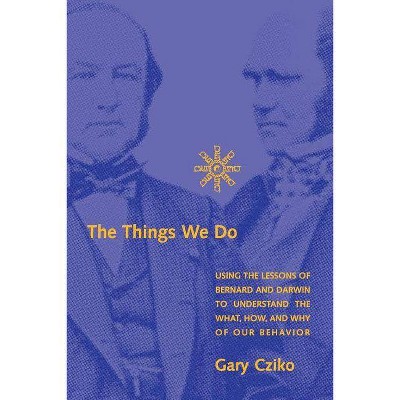The High Price of Materialism - (Bradford Book) by Tim Kasser (Paperback)

Similar Products
Products of same category from the store
AllProduct info
<p/><br></br><p><b> About the Book </b></p></br></br>A study of how materialism and consumerism undermine our quality of life.<p/><br></br><p><b> Book Synopsis </b></p></br></br><b>A study of how materialism and consumerism undermine our quality of life.</b><p>In <i>The High Price of Materialism</i>, Tim Kasser offers a scientific explanation of how our contemporary culture of consumerism and materialism affects our everyday happiness and psychological health. Other writers have shown that once we have sufficient food, shelter, and clothing, further material gains do little to improve our well-being. Kasser goes beyond these findings to investigate how people's materialistic desires relate to their well-being. He shows that people whose values center on the accumulation of wealth or material possessions face a greater risk of unhappiness, including anxiety, depression, low self-esteem, and problems with intimacy--regardless of age, income, or culture.</p><p>Drawing on a decade's worth of empirical data, Kasser examines what happens when we organize our lives around materialistic pursuits. He looks at the effects on our internal experience and interpersonal relationships, as well as on our communities and the world at large. He shows that materialistic values actually undermine our well-being, as they perpetuate feelings of insecurity, weaken the ties that bind us, and make us feel less free. Kasser not only defines the problem but proposes ways we can change ourselves, our families, and society to become less materialistic.</p><p/><br></br><p><b> Review Quotes </b></p></br></br><br>"An excellent, thorough, insightful examination of object hedonism and its psychological costs. Well-written to boot."--Amitai Etzioni, University Professor, George Washington University and author of "The Monochrome Society"<br><br>"Does money buy happiness? For years, social scientists knew relatively little about this important question. Now that has changed. On the basis of more than a decade's worth of original research, Tim Kasser provides a powerful answer--materialism undermines human well-being. "The High Price of Materialism" is a path-breaking work that suggests a fundamental rethinking of our values, behaviors, and economic structures. Deserves the widest possible readership."--Juliet Schor, Professor of Sociology, Boston College; author of "The Overworked American"<br><br>"Kasser powerfully argues that when we feel more vulnerable, we exhibit more sharply defined materialistic tendencies"-- pwforecasts, ""Publishers Weekly""<br><br>" An excellent, thorough, insightful examination of object hedonism and its psychological costs. Well-written to boot." -- Amitai Etzioni, University Professor, George Washington University and author of The Monochrome Society<br><br>" Does money buy happiness? For years, social scientists knew relatively little about this important question. Now that has changed. On the basis of more than a decade's worth of original research, Tim Kasser provides a powerful answer--materialism undermines human well-being. The High Price of Materialism is a path-breaking work that suggests a fundamental rethinking of our values, behaviors, and economic structures. Deserves the widest possible readership." -- Juliet Schor, Professor of Sociology, Boston College; author of The Overworked American<br><br>" Kasser powerfully argues that when we feel more vulnerable, we exhibit more sharply defined materialistic tendencies" -- pwforecasts, Publishers Weekly<br><br>" An excellent, thorough, insightful examination of object hedonism and its psychological costs. Well-written to boot." --Amitai Etzioni, University Professor, George Washington University and author of "The Monochrome Society"<br><br>" Does money buy happiness? For years, social scientists knew relatively little about this important question. Now that has changed. On the basis of more than a decade's worth of original research, Tim Kasser provides a powerful answer--materialism undermines human well-being. "The High Price of Materialism" is a path-breaking work that suggests a fundamental rethinking of our values, behaviors, and economic structures. Deserves the widest possible readership." --Juliet Schor, Professor of Sociology, Boston College; author of "The Overworked American"<br><br>" Kasser powerfully argues that when we feel more vulnerable, we exhibit more sharply defined materialistic tendencies" -- pwforecasts, "Publishers Weekly"<br><br>--Amitai Etzioni, University Professor, George Washington University and author of "The Monochrome Society"<br><br>--Juliet Schor, Professor of Sociology, Boston College; author of "The Overworked American"<br><p/><br></br><p><b> About the Author </b></p></br></br><p>Tim Kasser is Associate Professor of Psychology at Knox College, Illinois.</p>
Price History
Cheapest price in the interval: 16.59 on March 10, 2021
Most expensive price in the interval: 19.39 on November 8, 2021
Price Archive shows prices from various stores, lets you see history and find the cheapest. There is no actual sale on the website. For all support, inquiry and suggestion messages communication@pricearchive.us



















